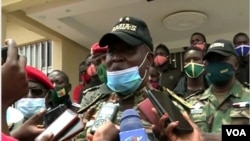Cameroon says its military has killed seven self-proclaimed separatist generals who blocked traffic for a month on roads in the central African state’s English-speaking western regions. The military says during a two-week operation, it recovered 70 vehicles the fighters had seized from civilians and rescued several women and children held hostage in separatist camps.
Cameroon said Friday its military had eliminated separatists from roads the fighters had illegally occupied in the English-speaking North-West region since July. Lieutenant Conrad Onana says he commanded government troops in one of several operations to neutralize fighters blocking roads.
Onana says a heavy exchange of fire lasted for over two hours starting at 1 a.m. Friday, when government troops attacked the fighters in Bafut. He says many of the separatists and their five self-proclaimed generals killed by government troops had been wanted by the military.
Onana did not give the total number of separatists killed in the raid.
He said the military rescued several women, including a pregnant woman, and a nursing baby held hostage by the fighters. He said at least six men were arrested for collaborating with separatists.
General Nka Valere is commander of government troops fighting separatists in the North-West region.
Nka says several hundred government troops took part in operations in which two self-proclaimed generals were killed in Bali in addition to the five in Bafut, towns in the North-West region’s Mezam Division. He says the generals killed by the military are called Small Pepper, Stone, Small Bible, Ibobe, Prince, Kobet and Babilla. He says his troops recovered many weapons and seized material the fighters were using for homemade bombs.
Nka said he is asking civilians to collaborate more than ever before with the military by reporting suspected separatist fighters hiding in their communities.
Separatists have said on social media that some of their fighters and generals were killed but have given no further details. The fighters say many government troops were also killed.
Nka said a few government troops sustained light injuries, but none were killed.
In July, Cameroonian officials prohibited use of motorcycles in Mezam. The officials accused separatists of using motorcycles for crimes, including the ambush and killing of five police officers in Bali July 18.
Cameroon said the separatist fighters also used motorcycles to attack and raze military positions, police stations and government offices.
On social media, separatists claimed responsibility for killing the police officers and burning buildings occupied by the military. The fighters also imposed a ban on motor vehicle traffic and promised to lift the ban when government officials allow motorcycle traffic.
The military said the separatists seized over a hundred vehicles that defied the ban and used the vehicles to erect road barricades.
The government said it ordered the military to clear the roads of separatist fighters because thousands of people who use the roads daily were stranded.
Deben Tchoffo, governor of the North-West region, said 70 vehicles were removed from the road. He said all the roads blocked by separatist fighters are now safe and useable. Tchoffo said Cameroonian President Paul Biya has reiterated that fighters who surrender and drop their weapons will not be prosecuted.
Twenty-four-year-old truck driver Innocent Njikong says it is the sixth time since 2015 that the government is assuring travelers that roads in the North-West region are safe. He says he is very certain that the fighters will not drop their weapons.
"How do you meet and convince them [fighters] when they are still staying outside? They [the military] have burned their [fighters’] houses,” Njikongsaid. “We are pleading to the government, let them [the military] drop their guns. We need to sacrifice in order to bring peace."
Njikong said by sacrifice, he means that the government should declare a cease-fire.
Cameroon has always said its military is not involved in any wrongdoing and that it will crush separatists who refuse to surrender.
Violence erupted in 2017 in Cameroon's English-speaking regions when teachers and lawyers protested alleged discrimination by the French-speaking majority. The military reacted with a crackdown and separatist groups took up weapons, claiming that they were protecting civilians.
The United Nations says over 3,000 people have been killed and 550,000 displaced in Cameroon and neighboring Nigeria since the conflict began.





